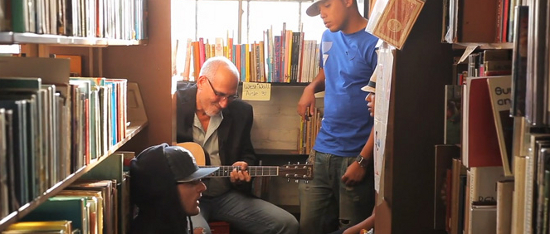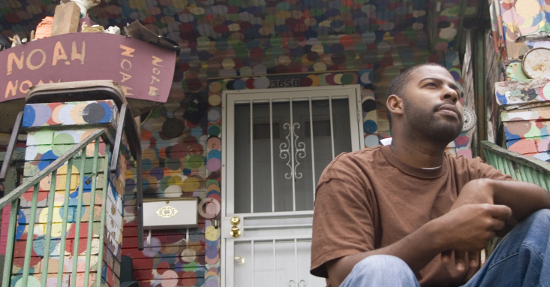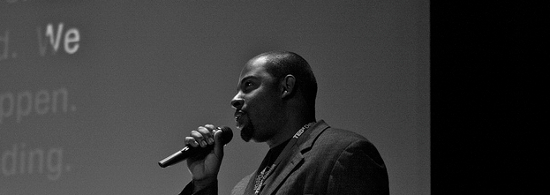Progress Report: Kickstarter, Touring and Building the Brand
Posted by Justin Boland on Jul 03, 2011 | 0 Comments

Ever since I ran the K-Murdock interview, there’s been a ton of requests: everyone wants more intel on Kickstarter. So here’s an interview with the team behind a winning underground hip hop campaign. Progress Report, a Detroit hip hop group, reached their $5000 goal for funding their debut album, and that was no accident. This interview is about a plan to win by design — dig it.

AH: How big is your team in 2011? Do you work with anyone else in terms of recording, engineering and mixing material or is that all you, too?
D. Allie: Of course there are many people who have helped and continue to help us along the way musically and business wise, but at the heart it’s a few that have Progress Report on their daily agendas. We got Hubert Sawyers on the management end of things, and it would be hard to accomplish much of anything on the day to day without Aaron Biggs who is also the head of United States of Mind. As far as the music end of things is concerned Eddie Logix handles all the production, recording, and mixing and Tenacity of the Abolitionists takes care of the mastering. Although the team is small we try to put in the hours to make up for that.
AH: Who are your role models in terms of “doing it right” — not so much musically, but in terms of business, promotion and pacing?
D. Allie: The first names that come to mind are One Be Lo and Dante LaSalle. These are two artists that were close enough to me in proximity and gracious enough to allow me to observe their actions and take notes. It sometimes came in the form of explicit advice but mostly I was able to see what they do and at first it was just me doing my best impersonation of that. As I get older and as the industry changes I have to improvise a little on my own and with the help of my comrades, but they taught me a very important lesson in their actions that will never change and that lesson is this. If you want to make something happen in life it’s up to you to make it happen for yourself. I wanted to play shows so I set up my own. I wanted to release an album so I recorded one. I wanted to tour so I set up shows in other locations. There was a time when I was perhaps waiting for others to take care of this for me. That’s not to say I don’t have dreams of delegating more though. lol.

AH: What life changes have you made (or realized you had to make) in order to re-organize your existence around your music? Was this a big step or a natural progression?
D. Allie: It’s not necessarily life changes as much as it is a sacrifice. You definitely have to keep a schedule. Frankly I’m still in a position where I have to work other job(s) to stay afloat and I’m constantly investing my own money into it. It’s a constant natural progression with the occasional big step like when we set up a bigger show or go on a more extensive tour because that just takes up more time. It is my goal to make music my only job by the end of the year. If I am able to do that then I’ll be able to take multiple big steps, but until then it’s natural progressions with well thought out big steps.
When you are in a DIY state of mind it’s hard to stop working because you know every move you make takes you one step closer to where you want to be. The only problem is that it’s hard to gauge the distance to final destination, and in reality you know final destination doesn’t even exist. You’re always pushing for more, better, greater. This makes it hard to have a relationship and see friends and family because there’s always something to be done. It’s also a goal of mine this year to allow myself to relax. It is all about the journey at the end of the day so I better enjoy it, but that’s easier said than done.
Were you getting most of your dates through a booking agent or did you set up this tour DIY style?
D. Allie: What are these booking agents you speak of and how do you acquire one? lol. I would love to have a booking agent but this is yet to be attained so that’s one more hat I’m currently wearing. The thing about DIY is I approach everything with a low budget philosophical approach as I didn’t really come into this game with any outside knowledge. So when I first started setting up a tour I asked myself questions and I figured there were two approaches, and here they are:
Contact venue directly - this is good from a power standpoint because you become in control of the show date/set time/cash/line up and since you’re doing it yourself you know it’s gonna get done. However, with power comes responsibility so you have to find the right acts in each city. Basically I’m looking for myself in each city. You are hoping that they have aspirations of touring as well because then you can add extra value for them by setting them up a show in your city. This is also difficult because all venues really care about is how many people you draw and as an artist on the come up you don’t draw shit in the town over let alone another state and you’re not there physically to do the ground work so you have to rely on an act local to that area.
Contact artist directly - You have a better chance at having a fellow artist set up a show for you but the drawbacks to this are as follows. He’s just like you in the fact that he’s wearing a lot of different hats and he’s wearing them all for him and you are wearing yours for you. Therefore, it’s not at the top of his priority list to set up a show to your liking, pay you what you need to get to the next city, or even hook you up with a couch when you’re in town. And that’s even if they decide to take the time out of their day to set you up with a show. However, like I said above if you can add value to his life by setting him up a show in your town this changes the game a little bit.
I realize this might sound a little jaded and bitter, but I’m really not trying to come from this perspective at all. It is what it is and great things come from great struggle so all though I struggle with it at times I love the back and forth. A. Biggs who is the head of USM has built up a great rapport with other acts by heading up a monthly event in Detroit called BlueCollar Gentlemen where we bring in an act from out of town every month. Also as we tour more and more we have built up a rapport with venues and actual people in each city so you could say we now have a modest regional base. We grow stronger as a touring force with each one we set up because there are more CD’s distributed in each city and more email addresses on the list.
Meet Hubert Sawyers

AH: What has your level of involvement been as a consultant? Are you guiding the process or mostly giving feedback and advice on a pre-existing roadmap?
Hubert Sawyers III: My level of involvement progressed over time. About a year ago, me and D. [Allie] would just chop it up over his plans for Progress Report. He would share his business plan and investor proposals, wherein my mind would be blown. In late fall, when it seemed like the quest for an investor was not going to materialize, I pushed D. to do a Kickstarter campaign, because I knew he had the network to harass to make it happen.
Once D. and Eddie decided the Kickstarter was a good idea, I came on in an actionable capacity. The contributor levels were designed by me and D.; I wrote the copy for the landing page. Then I devised a content strategy to get the promote the campaign. Any major decisions on marketing the impending release started going through me after we secured our Kickstarter goal at the literal 11th hour.
AH: What kind of experience did you draw upon when you were setting up the Kickstarter campaign?
Hubert Sawyers III: I got a lot of inspiration from Detroit’s LOVELAND project (http://makeloveland.com/). They made it clear that with the right mission and a little creativity that you can provide a scope that will get people to come off some coin. I know that sounds rough, but fundraising is not an activity for the meek.
When it came down to it, I wanted to provide as much value for the end-user as possible. As a music fan, I thought about what I would find intriguing if I were to give money to a music act in advance. Trust me, it would take quite a bit, if I did not already know a lot of their work. Then again, if Thom Yorke was asking for advanced purchases of his next record, he would still need to make a compelling deal for my hard-earned scratch.
I also did not want Progress Report looking like a charity case. That is why we set up our levels the way we did, we wanted people to feel like they were getting in on the beginning of a significant event.
It was also imperative that we shoot for a lofty-enough goal that would not have the guys scrounging for more loot. As far as I’m concerned, this is the one and only crowd-sourced micro-funding campaign that will be done by Progress Report, so we needed to make this count.

AH: What have you been learning about the art of working with artists?
Hubert Sawyers III: To give you some insight, my nickname around my rapper circle now is “The Humbler,” so I am not sure if I have learned enough yet (ha ha).
People consult me all the time about how to market their music. The only way I can respond is how I hear it when I was pushing my music or my digital communications business to another person or business - critically. Therefore, I am constantly asking, “So?” It is now a part of my nature to push people to make the best of something. Occasionally, brilliance is presented to me and I say nothing, but that is so rare. The best thing I have learned is that I need to always make sure the artist understands their big picture. If the action we’re considering in the short-term really doesn’t help the long-term goal, then it may need to be adjusted. At this point, I have learned to not worry so much about offending. If you offend easily, then you are not cut out for working with me. I am not a mean dude. It is just that a one-man company, I only have so much time to lend to anyone that isn’t driving income. People that know me understand that and they interact with me accordingly.
I have also adopted the ideas of “I don’t know everything” and “collaboration is awesome.” Everything we did for the Progress Report release was not driven by one person. Whether it was an idea I had, Allie or Eddie, we always vetted the idea as a group and that made the idea more effective in the end. When I do my music branding workshop, I encourage my patrons to give their own perspective, because while we may be on the same page, people say things differently. As a copywriter, I write to be effective in a general sense, but I know that I will always miss the mark with someone, no matter how hard I try. I apply this collaborative method to working with artists as well.
